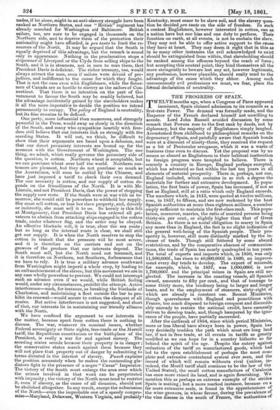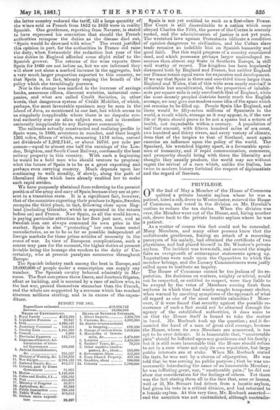THE PROGRESS OF SPAIN. T WELVE months ago, when a Congress
of Paris appeared imminent, Spain claimed admission to its councils as a first-rate Power. The demand was formally made, and the Emperor of the French declared himself not unwilling to accede. Lord John Russell avoided discussion by some remark that Powers rose to the first rank by deeds, not by diplomacy, but the majority of Englishmen simply laughed. Accustomed from childhood to philosophical remarks on the degeneracy of Spain, and painfully aware that Spanish bonds were at a discount of ninety-three, they received the request as a bit of Peninsular arrogance, which it was a waste of business time even to discuss. Yet the proposal was by no means so absurd as Englishmen in their habitual inattention to foreign progress were tempted to believe. There is scarcely a country in Europe, England perhaps excepted, which has advanced so fast within the last ten years in all elements of material prosperity. There is, perhaps, not one, England included, which contains in so rich a degree the materials for further and extensive development. In popu- lation, the first basis of power, Spain has increased, if not as fast as England, still at a ratio which only England exceeds. The numbers which, in 1815, were quoted at twelve millions, rose, in 1857, to fifteen, and are now reckoned by the best Spanish authorities at more than eighteen millions, a number amply sufficient to maintain the first-class rank. This popu- lation, moreover, marries, the ratio of married persons being thirty-six per cent., or slightly higher than that of Great Britain. As there is no social obligation to marry in Spain any more than in England, the fact is no slight indication of the general well-being of the Spanish people. Their pro- sperity is, however, still more distinctly marked by the in- crease of trade. Though still fettered by some absurd restrictions, and by the comparative absence of communica- tions, the trade of Spain has nearly quadrupled in ten years. The total of exports and imports which, in 1850, was only 11,500,0001., has risen to 40,000,0001. in 1860, an improve- ment every day tends to develop. The export of minerals, for example, which, in 1857, was 1,000,0001. is now 1,700,0001. and the principal mines in Spain are still ne- glected. The increase in the coasting vessels, all Spanish owned, amounts to fifty per cent., and that of tonnage to some thirty more, the tendency being to larger and longer boats, and to the employment of steamers, sixty-eight of which are already in constant use. Recent Ministries, though quarrelsome with England and punctilious with France, too much disposed to foreign conquest and discredit- ably unready to restore the national credit, have earnestly striven to develop trade, and, though hampered by the igno- rance of the people, have partially succeeded. After the outbreak of 1854, since which period Ministries, more or less liberal have always been in power, Spain has very decidedly trodden the path which must ere long land her, if not in free trade, at all events in tariffs as greatly modified as we can hope for in a country hitherto so far behind the spirit of the age. Despite the outcry against reduction of the tariff on manufactured goods, which bad led to the open establishment of perhaps the most com- plete and extensive contraband systeni ever seen, and the record of which will remain withouta rival (unless, in- indeed, the Morill tariff shall continue to be the law of the United States), the small cotton manufacture of Catalonia has once more raised its head, and is again flourishing. We mention this as perhaps an extreme example of the strides Spain is making ; but a more marked instance, because on a far more extensive scale, is found in the apprehensions of the wine-growers, in whose favour, during the prevalence of the vine disease in the south of France, the authorities of the latter country reduced the tariff, till a large quantity of the wines sold as French from 1852 to 1859 were in reality Spanish. One gentleman, reporting from Navarre, is stated to have expressed his conviction that should the Frenoh authorities reimpose the duties as the disease died out, " Spain would be drowned with wine." The event justified this opinion in part, for the authorities in France did raise the duty, when fortunately the reduction last year of the wine duties in England afforded some alight relief to the Spanish grower. The returns of the wine exports from Spain for 1860 are not before us, but we are informed they will show not alone a marked increase in the aggregate, but a very much larger proportion exported to this country, so that Spain is, in fact, 'already reaping the benefit of the policy which she tremblingly pursues. Nor is the change less marked in the increase of savings banks, assurance offices, discount societies, industrial com- panies, and what are called Credit Societies, in other words, that dangerous system of Credit Mobilier, of which, perhaps, the most favourable specimen may be seen in the island of Java, as mentioned in our last, but which seems to us singularly inapplicable where there is no despotic cen- tral authority over an alien subject race, and is therefore eminently inapplicable to any European community, The railroads actually constructed and realizing profits in Spain were, in 1860, seventeen in number, and their length 1201 miles, fifteen of which, measuring 1116 miles, earned net dividends of 1,202,7141., or about 10781, per mile per annum-equal to almost one half the earnings of the Lon- don, Brighton, and South Coast Railway, confessedly the best railway property in this country. With such a beginning he would be a bold man who should venture to prophesy what the future of Spain is to be as a great exporting and perhaps even carrying country. Much depends upon her continuing to walk steadily, if slowly, along the path of liberalized ideas which have already enabled her to make such rapid strides.
We have purposely abstained from referring to the present position of the army and navy of Spain because they are at pre- sent in a transition state. It is a significant fact, however, that of the countries exporting their produce to Spain,Sweden occupies the third place, in fact, following close upon Eng- land (including Gibraltar, which is separated in the return before us) and France. Now Spain, as all the world knows, is paying particular attention to her fleet just now, and as Swedish iron can always command its own price in the market,. Spain is also " protecting" her own home metal manufactures, so as to be as far as possible independent of foreign markets for these prime articles of necessity in the event of war, In view of European complications, such a course may pass for the moment, the higher duties at present leviable being the homage she renders to the deity of Un- certainty, who at present paralyzes commerce throughout Europe. The Spanish infantry rank among the best in Europe, and 18,000,000 of people under a conscription can supply any number. The Spanish cavalry behaved admirably in Mo- rocco. The fleet comprises three liners, and fourteen frigates, afloat or building, and is manned by a race of sailors who, in the last war, proved themselves stauncher than the French, and the whole are supported by a revenue which has reached nineteen millions sterling, and is in excess of the expen- diture.
BUDGET Expenditure estimated Revenue Hasps OF EXPENDITURE. FOR 1861. £19,324,743 19,886,800 HEADS OF REVENUE ESTIMATE.
1. Royal Family
£513,500 1. Direct Imports 5,208,700 2. Legislative Pensions ... 23,847 2. Customs, &c 4,000,000 3. Debt 8,660,187 2a. Sundry returns included
4. Justiciary Personnel 156,411 in foregoing 622,080 5. Pension Lists 1,441,300 3. Stamps of various kinds. 1,018,600 6. Council 4,360 4. Monopolies of Govern-
7. Provincial Expenses 113,719 ment, &c 4,470,000 8. Expenses of Control:Ad-
5. Lotteries 1,420,000 ministration of Gene-
6. Bankers' Taxes, &c 78,520 ral Government 160,838 7. Other sundries (miles-
9. Judicial Establishments, &c. 301,527 posters), 8ac., about... 8. Government Mines 150,000 422,560 10. Ministryof Worship, &c. 1,738,330 9. From Church Property. 492,500 11. War Budget 3,264,133 10. Sundries, aboat 100,000 12. National Guard, &c
413,177
11. Colonies 1,390,000 13. Colonial, paid by Home
Government 11,025
14. Marine 1,143,816
15. Police and Health, 9 L 626,565
16. Post 345,339
17. Ministry of Progress 53,075
18. Agriculture, &c. 82,889
19, Public Instruction 246,489
20. Public Works 476,612
21. Certain extra expendi- ture 26,897
Spain is not yet entitled to rank as a first-class Power. Her Court is still discreditable to a nation which once obeyed Charles the Fifth, the power of the Cortea is scarcely - rooted, and the administration of justice is not yet pure. The wretched laws against Protestants iddicate a condition of opinion dangerous to civilization, and the Cuban slave trade remains au indelible blot on Spanish humanity and good faith. But this rapid progress of a country considered dead, and which possesses perhaps larger undeveloped re- sources than almost any State in Southern Europe, is still well worthy of record. The kingdom has been hopelessly distanced both by England and France, but neither England nor France retain equal room for expansion and development. If we say that Spain is three and one-third times larger than England and Wales, that of this wide area nearly one-half is culturable but uncultivated, that the proportion of inhabit- ants per square mile is only one-fourth that of England, while the most densely peopled districts barely reach the English average, we may give our readers some idea of the space which yet remains to be filled up. People Spain like England, and there would be fifty-seven millions of Spaniards in the world, a result which, strange as it may appear, is, if the new life of Spain should prove to be not a spasm but a return of health, not improbable within a century. A, population of half that amount, with fifteen hundred miles of sea coast, two hundred and thirty rivers, and every variety of climate, from that of the tropics to that of Scotland, must again exercise an influence upon the policy of the world. The Spaniard, his wretched bigotry apart, is a favourable speci- men of humanity, and if rapid communication, commerce, and prosperity should bring with them the liberality and thought they usually produce, the world may see without regret the revival of a race which, unlike the Italian, has twice in modern history forfeited the respect of diplowatista and the regard of freemen.































 Previous page
Previous page